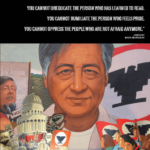iCivics presents a series of short, animated videos that examine the actions and accomplishments of civil rights activists of the 1950s and ’60s. Barbara Johns, Constance Baker Motley, and J.D. and Ethel Shelley, these figures probably haven’t made it to your textbook, and yet their contributions have helped shape our nation in insurmountable ways. Videos are assignable, end with questions for generating classroom discussion, and come with a downloadable Teacher’s Guide. Visit a video’s lesson page to view or assign it and access the guide.
Declaration Revisited: Declaration of Sentiments Podcast
The Declaration of Independence called George III a tyrant. And in 1848, a group of women’s rights activists mirrored our founding document to accuse men of the same crime. Today in our final revisit to the Declaration of Independence, we explore the Declaration of Sentiments, the document at the heart of the women’s suffrage movement.
Our guest is Laura Free, host of the podcast Amended and professor at Hobart and William Smith Colleges.
This short episode includes a one-page Graphic Organizer for students to take notes on while listening, as well as discussion questions on the back side.
Choice Board – Conversations with Suffragists
On August 18, 1920, women won the right to vote with the ratification of the 19th Amendment. In this lesson, students will hear suffragists Susan B. Anthony, Sojourner Truth and Alice Paul, as portrayed by interpreters from the American Historical Theatre, talk about their experiences as activists.
Martin Luther King Jr. and the Power of Words
In this lesson students have the opportunity to discuss how words have the power to bring about political, social, or economic change in society. By reviewing quotations from various leaders, activists, and others, students can begin to understand how ideas have an impact on the hearts and minds of people and can be a catalyst for change. Finally, students will reflect on the words of Martin Luther King Jr. and determine their relevance to the political, social, and economic issues of today.
From Suffragist Sashes to Antiwar Armbands
In a 19th Amendment video, produced by the Administrative Office of the U.S. Courts for use in classrooms, courtrooms, and the distance-learning space, an unlikely connection is made between two rights activists from different eras. Suffragette Virginia Minor and Vietnam war protester Mary Beth Tinker were separated by 100 years, but their passions came together in the legal history of the nation and of St. Louis, where they each worked through the courts to make social change. Both cases were decided – with different outcomes – by the Supreme Court of the United States.
Rights of Farm Workers: Labor Leaders César Chávez and Dolores Huerta

March 31 is César Chávez Day and April 10 is Dolores Huerta Day. Use these K-12 lesson plans and resources to celebrate the life and legacy of these civil rights and labor activists. Topics span their co-founding of the United Farm Workers union, their use of nonviolent protests to fight for the rights of laborers and includes other change-makers like Lucas Benitez and Librada Paz.
LGBTQ Activism and Contributions Primary Source Set
The lives, freedom struggles, and social and cultural contributions of lesbian, gay, bisexual, transgender, and queer (LGBTQ) people make up a rich part of the history of the United States, and primary sources from the Library of Congress provide valuable opportunities to explore individuals, movements, and events from the nation’s LGBTQ history.
Who Were the Foremothers of the Women’s Suffrage and Equality Movements?
This lesson looks at the women’s suffrage movement that grew out of the failing of the Continental Congress by “remembering the ladies” who are too often overlooked when teaching about the “foremothers” of the movements for suffrage and women’s equality in U.S. history. Grounded in the critical inquiry question “Who’s missing?” and in the interest of bringing more perspectives to whom the suffrage movement included, this resource will help to ensure that students learn about some of the lesser-known activists who, like Elizabeth Cady Stanton, Lucretia Mott, and Susan B. Anthony, participated in the formative years of the women’s rights movement.